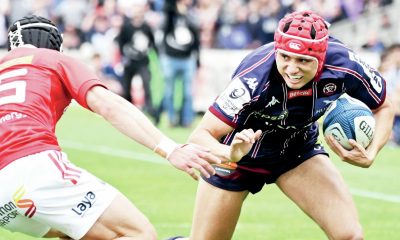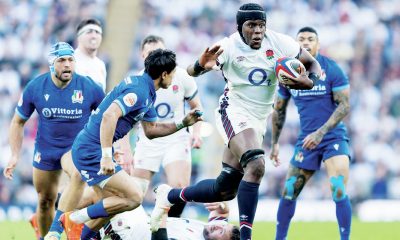 In sport you get so many highs and lows, and the great thing is its unpredictability. Given the great year of sport we have just left behind, we always tend to focus on the highs in any sport, and Rugby Union is no different – the Autumn Internationals, the Six Nations, the Heineken Cup, the elite – and not spend much time on the lows.
In sport you get so many highs and lows, and the great thing is its unpredictability. Given the great year of sport we have just left behind, we always tend to focus on the highs in any sport, and Rugby Union is no different – the Autumn Internationals, the Six Nations, the Heineken Cup, the elite – and not spend much time on the lows.
If you have not been involved in a relegation battle it is hard to understand what the emotions going on within a squad must be. Take a squad like Sale. All they have heard since the first few games of this season is relegation, whereas the clubs at the other end of the table like Saracens, Harlequins, and Leicester will not have let it enter into their psyche.
Sale, despite winning their last game of 2012, are still embroiled in relegation, and it’s a tough working environment. At the start of the season it was London Welsh who were hot favourites to go straight back down, and I still believe they will be in the survival fight. However, Sale were not meant to be there.
Not only did they have Bryan Redpath arriving as their new director of rugby after leaving Gloucester in a hurry, but the gritty northerners, the last outpost of Premiership rugby above the midlands, were meant to be going up, not down. They had big imports like Danny Cipriani and Richie Gray, along with other international players like scrum-half Dwayne Peel, and Andy Powell and Richie Vernon in the back row, and exciting young talent in the backline like Rob Millar.
It appeared that Sale had actually strengthened their squad after qualifying for Europe, and that they would steam on and compete for a top four finish in the Premiership and in the Heineken Cup. Instead, we had the club’s main backer, Brian Kennedy, becoming so frustrated that he made outspoken comments just before Christmas about some of the players, including Cipriani, and the general malaise at the club.
It is understandable given the level of investment Kennedy has made in Sale, going back to the Saint-Andre era – but you never hear any of the owners or top executives of leading clubs like Harlequins or Leicester talking like that. Perhaps they do their homework better, because anyone who didn’t know that Cipriani wasn’t the best defender in the world didn’t do theirs. If there was one thing the Sale coaches had to do when Cipriani arrived it was to work on his defence, and it should all have been sorted in pre-season. The problem was that there was an area of weakness they did not resolve.
Since then it’s been like Coronation Street up there, with so many sub-plots, including Redpath being demoted from director of rugby to head coach. You’ve also had chief executive Steve Diamond jumping in and out as coach, while also attempting to sort out the disastrous first half of the season by bringing in John Mitchell, only for the Kiwi to head back to South Africa after a month.
Rugby is such a collective commitment, and the big fight in a competitive league like the Premiership is that to be successful you have to win not only at home, but away. Sale have found it difficult to do either, and they are a long way into the mire. You can only conclude that there’s been something toxic in the cocktail, because it’s a blend that not everyone seems to like.
However, if you look at the squads of Sale, London Irish and London Welsh, the three teams in the relegation battle, then Sale have the edge – and if the players play to their ability then they can still get the club out of the hole.
It’s hard to understand how London Irish have got themselves into the relegation zone when you look at players of the calibre of Alex Corbisiero, Jonathan Joseph, Topsy Ojo, Sailosi Tagicakibau, Tom Homer and Ian Humphreys.
The real issue is that there has been such a big turnover of players and coaches that they have lost their way. Not only did key players like Bob Casey, Delon and Steffon Armitage, Seilala Mapusua and Nick Kennedy retire or move on, but they also lost the coaching framework established by Toby Booth, Neal Hatley and Mike Catt before the season started, leaving Brian Smith to make a new start by himself.
That level of loss on the playing and coaching front is massive, and no club can lose that level of experience, and also guys in their prime, like the Armitages. A lot of them had been at the club so long that the soul of the side was ripped out.
On top of that there has been the talk of England’s stars Corbisiero and Joseph moving on, while Shaun Edwards’ beat them to it, resigning his one day a week role as defence consultant just after New Year. The only coach I believe can do one day a week is a kicking coach. One missed tackle affects a whole team, so defence is a collective attitude, and I don’t believe you can create that during one day a week.
Whether he likes it or not, Smith had his reputation tarnished by the England 2011 World Cup audit, and it will take time for him to rebuild it.
However, he knew what he was coming into, and is a confident individual who was up for a challenge – he wanted to front up, and prove people wrong. The only problem is that the Irish have conceded 31 tries and scored only 16, although two of them did come yesterday against Gloucester so perhaps Smith can hope for some progress now.
For London Welsh everything was last-minute Larry, but the promoted club have fought incredibly hard to get themselves above London Irish and Sale. The Welsh know how to fight, and despite not having as many stars as the other two relegation contenders, you can bet they are resilient because of what they have already been through to get into the Premiership.
Coach Lyn Jones has got Gavin Henson back playing, which is an achievement in itself, and what I like about Jones is there’s no hiding. He comes out and says it how it is. So much about sport is mental attitude, and these London Welsh guys have been in a fight since before they got in the Premiership, and are used to pressure.
Sale and London Irish probably never thought that they would be in a relegation scrap – but London Welsh knew they would be.
From this half-way point it looks as if their run-ins balance out in terms of difficulty, although London Welsh have drawn the short straw with four away games on the bounce between the last week in February and the end of March. However, the most decisive games will be those between the three clubs, with London Welsh at home to Sale (Feb 17), London Irish at home to Sale (March 30), and London Irish at home to London Welsh (April 20).
At the moment both London Welsh’s relegation rivals would do anything for the two extra wins, and eight points, that they have in the bag – and if the Welsh win just one more game they will make it incredibly difficult for the two tail-enders to overtake them.

3 Comments
You must be logged in to post a comment Login
Leave a Reply
Cancel reply
Leave a Reply
You must be logged in to post a comment.




























Pingback: micro step
Pingback: LSM99 บาคาร่าเว็บตรง
Pingback: jarisakti